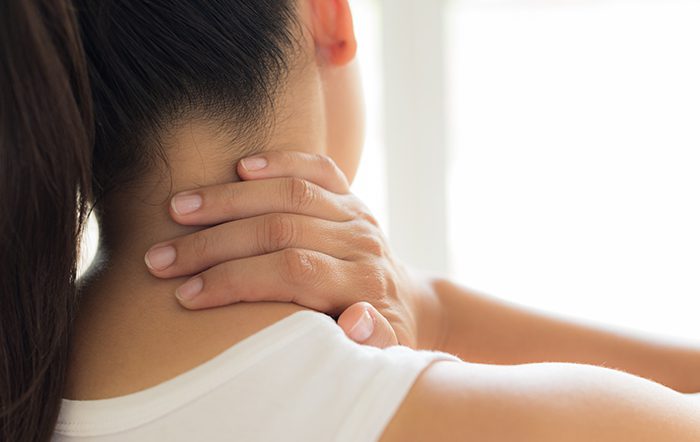This is a guest post by Alegra Kastens, M.A., LMFT, founder of The Center for OCD, Anxiety, and Eating Disorders.
Obsessive Compulsive Disorder (OCD) is a debilitating mental health condition that can significantly impact a person’s mental and emotional health. While it is a mental health condition, its symptoms can also impact a person physically: skin conditions from excessive sanitizing, nausea from heightened anxiety, exhaustion from lack of sleep, and more.
Exhaustion + Fatigue
OCD symptoms can impact one’s relationship with sleep, whether they fear it or seek it to avoid symptoms, and one’s ability to fall and stay asleep. On the compulsions front, excessive and time-consuming behaviors (both mental and physical) can keep a person up at night and interfere with their sleep schedule. Someone with scrupulous obsessions may stay awake repeating the same prayer over and over until it feels “right” internally. A new mom with postpartum obsessions may compulsively stare at the baby throughout the night to make sure that the baby is breathing. Those who perform mental compulsions may lay in bed ruminating for hours about obsessions before they finally fall asleep.
Sleep can also be frightening for those with OCD who fear dreaming about their obsessions. We do not have control over what we dream about and this lack of control can exacerbate anxiety for those who don’t want to see their deepest fears (ex. a sex dream with an animal or a dream in which they violently stab their partner) play out while they’re asleep. Such individuals may experience immense dread and panic around bedtime, despite their desire to have a peaceful and restful night sleep.
Sleep disturbances brought on by OCD symptoms do not just cover the quantity of sleep, but the quality of it as well. Anxiety can impact REM sleep, which is the deepest sleep stage that facilitates a reorganization of neuronal circuits. If high levels of anxiety, obsessions, and/or compulsions are keeping a person awake at night, it might be difficult to stay asleep and enter the REM sleep stage that helps recharge the brain and preserve its functioning.
Lack of sufficient sleep can lead to both exhaustion and fatigue for the OCD sufferer, as can the heightened levels of anxiety that those with OCD experience as a result of a hyperactive brain. The brain misfires for people with OCD, which can leave them in a perpetual state of fight-flight-or-freeze and hyperarousal when danger isn’t present. This hyperarousal can lead to the body feeling fatigued.
Headaches
People with OCD experience repetitive, intrusive, unwanted thoughts (obsessions) that can pop in, replay, and loop. These persistent, intrusive thoughts can lead to excess pressure in the head and tension headaches. Those with OCD also tend to spend an excessive amount of time engaging with their obsessions mentally. This is called a mental compulsion, which is not to be confused with intrusive thoughts. Whereas intrusive thoughts pop in and are out of one’s control, mental compulsions—such as rumination (actively perseverating about an obsession) or mental review (replaying the past over and over)—are choices. The person with OCD is actively choosing to engage with obsessions, which can also lead to tension headaches.
Physical Injuries
OCD symptoms can lead to dissociation, a state in which a person feels detached from their mind, body, and surroundings. Dissociation is known as “the escape when there is no escape.” It can be the brain’s way of trying to protect a person from emotional distress such as the heightened anxiety a person with OCD experiences. On a personal level, I experienced dissociation for years when my OCD was most severe and often felt like I was one step removed from the world around me. This led to a lack of motor coordination, causing me to fall a lot. My knees were constantly cut open and bleeding. Additionally, I got into frequent car wrecks when dissociated and when performing mental compulsions that distracted me from being fully present.
Compulsions can also impact a person physically. Those with contamination obsessions might have cracked, bleeding skin from compulsive sanitizing. They may experience skin infections as a result of the excessive sanitizing. Others might experience soreness or bruising from punching themselves in the head or pinching themselves every time they have an unwanted thought.
Body Aches
People with OCD may experience a hyperawareness of bodily sensations like blinking, swallowing, breathing, etc. This hyperawareness, along with the compulsive checking that one often performs to see if the hyperawareness is gone, can lead to body aches. The eyes can become heavy, the throat may feel thick, and the chest may be sore from the excessive checking of breathing. Those with sexual obsessions may experience arousal non-concordance and feel sensations in the groinal area when the unwanted thoughts arise. Many people with OCD also compulsively check for groinal responses over and over again, to make sure that they are not aroused by obsessions, which can lead to an aching groinal area.
Nausea/Stomach Aches/Diarrhea
Obsessions, compulsions, and heightened anxiety can impact gastrointestinal functioning because the brain and gut are connected. Furthermore, heightened levels of anxiety associated with OCD lead to physiological responses in the body. When we are anxious, the sympathetic nervous system activates to prepare the body to fight, flight, or freeze. It works to enhance our ability to survive. During this process, chemicals released by the brain to keep the body alert can enter the digestive tract and impact the gut microbiome. Such impacts include nausea, diarrhea, ingestion, decreased appetite, cramps, and more.
Moving Forward
If you are experiencing such psychosomatic symptoms as a result of OCD, talk to your therapist and/or medical professional about this. The physical impacts of OCD are valid and can diminish along with one’s OCD symptoms. In other words, doing exposure and response prevention (ERP) therapy to eliminate compulsions and respond to one’s obsessions and anxiety in a new way can improve a person’s physical health, as well.

